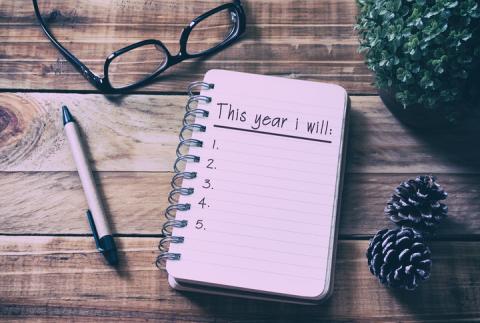If Bridget Jones were writing this PhD diary, she might begin a review of her first term with an inventory like this:
“Supervisions – six; books read – 37; words written – 25,764 (hurrah!); free glasses of wine drunk – 142 (gah!); hours lost being lazy or procrastinating – oh thousands.”
I didn’t keep track of my first term with such precision but I have been thinking about what went well and not so well in 2017.
After weighing up the highs and lows, I’ve identified ways that I can improve my experience of doing a PhD. Some are small, practical changes for me alone; others are aimed at supporting an effective, collaborative research environment.
So, in the spirit of Helen Fielding’s beloved heroine, these are my PhD resolutions for a new year of studying.
1. To do or not to do
At the end of November, my mum suggested that I start planning my work each day with a short list of tasks to complete. As always, my mum’s advice turned out to be very helpful, so I’m going to start doing this every day from now on.
Sitting down in the evening to choose a few achievable goals is a great way of giving the next day direction and purpose. To balance things out, I tend to set myself extremely easy tasks (send an email) alongside more challenging targets (finish a long piece of writing).
While it can be incredibly satisfying to tick off a task, don’t take it too seriously and punish yourself when you don’t get everything done. The point of the plan is to help you organise your work and give you a chance to track your progress.
2. Back it up
How many students have woken up in the middle of the night, sweaty and breathless, from a dream in which they’ve lost their work? Plenty, I’m sure.
And how many students have actually lost their work after accidentally deleting it, after their laptop breaks, or when their dad unknowingly wipes the laptop’s memory (true story)? Even anecdotally, I know that it’s too many.
I’ve been lucky enough to avoid this kind of trauma, but I’ve never properly protected my files.
This year will be the year when I finally start backing up my research and draft chapters, either by digging out the external hard drive that I never use or, more sensibly, by setting up an account with a cloud backup service so that my work automatically saves.
3. A word a day
You’re never too old or too qualified to expand your vocabulary. I’d like to learn new words every day, keeping a list close to hand so that I can jot down any unknown terms that I come across while reading.
PhD diary: the romance versus the reality of a PhD
4. Show
It’s hard to reveal early drafts of work, especially when you are only at the beginning of the project. Your ideas aren’t fully formed, your argument isn’t completely watertight, and your writing is unlikely to be beautifully polished.
Whether it’s with staff, other students or your friends, sharing work can be embarrassing and leave you feeling vulnerable. What if they say that it’s awful? What happens if you have to start from scratch?
I’m going to do my best to resist those anxieties and show my work to lots of people. Getting fresh pairs of eyes to look over your work is the best way to identify errors and weaknesses, but it is also a chance to receive some praise and encouragement.
People are, for the most part, kind and generous in their feedback. If they’re not, however, it’s important to try to be resilient. Universal approval is not realistic and we should still be confident in the face of criticism.
5. …and tell
Don’t forget to return the favour by praising your peers with regard to all the good work that they’re doing.
Not only is it important to work collectively, with the aim of helping and supporting your colleagues, it’s also useful and inspiring to see what your peers are doing.
6. Keep it together
Alan Bennett writes his diaries by hand, on anything – refill pads, the backs of utility bills, envelopes – and then in great piles they are taken away to be typed up.
I, too, have always preferred writing on paper, but I’m trying to kick the habit of making notes on odd scraps of paper that I then end up stapling or paper-clipping together.
I’ve never been one for the fancy, expensive notebooks that people of my generation fuss over, however, what I will be investing in is a strong, bound notebook to ensure that all my ideas and jottings are safe in one place.
7. Surround yourself with intellectuals
Asking questions at seminars and conferences can be daunting, particularly when very clever and eminent scholars are in the audience. It can be equally difficult to navigate a room of strangers who are clinking glasses and munching crisps at a networking reception.
But socialising is valuable in many ways. Whether in the Q&A or over nibbles, I’ll be making more of an effort to meet and talk to new researchers.
Making friends and engaging in conversations improves well-being and research. While we all fear sounding stupid, the best ideas often emerge when we are engaged in dialogue with other people.
Read more: 12 monthly resolutions for graduate students

Comments